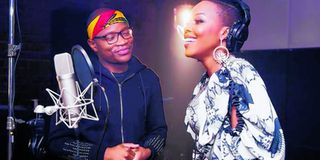‘Jerusalema’ hit brought joy to many, but ended in royalties shame

Master KG (left) and Nomcebo Zikode.
“Jerusalema” was like any other South African hit, until it became a global lockdown anthem.
There was an endless stream of videos from fans of the track as they danced to its catchy tune. To date, the song has garnered at least 1.8 million views on YouTube and was streamed more than a hundred million time on Spotify.
It went diamond in France, triple platinum in Italy and double platinum in Spain, while also becoming a number-one hit in South Africa, Switzerland, Belgium, Romania and Netherlands. At one point, it claimed position four on Billboard’s world digital song sales chart.
Released in November 2019, the project raked in millions of dollars from various online streaming platforms and scaled global heights never reached by a South African song before.
But the recent bickering over royalties has sullied a jam that brought happiness to many Africans, and is threatening to dilute its success.
Nomcebo Zikode, the songwriter whose vocals gave the song its signature tune, claims she has “not been paid a cent” for her work.
Master KG, the song’s producer and co-songwriter, says otherwise, noting that Zikode has been paid her dues and is owed nothing from the project.
Legal battle?
A legal battle is now expected between Zikode and Master KG after the former said the royalties “matter is now with my lawyers”.
She said she had “been ridiculed, with efforts to marginalise my contribution” in what has thrown her into a “difficult time”.
But Master KG insists she is not telling the truth. He challenged her to “confirm if you [have] not yet received R1.5 million so far from ‘Jerusalema’”.
However, Open Mic Productions, the record label that produced “Jerusalema”, acknowledged that Zikode was yet to receive royalties from the song and that “the amount given to Nomcebo was for different revenue of the song”.
Indications are that the two had a verbal agreement to share the money. The artistes settled on an equal split of 50/50 but Master KG, the main artiste, says Zikode, a featured artiste, now wants a 70 per cent share, to leave him with 30 per cent.
The parties are yet to put pen to paper and that is what is likely to see this matter drag on.
It is not the first time Zikode has been involved in such a fight. In 2018, popular DJ Ganyani sought an order from the South Gauteng High Court banning Zikode from performing all songs recorded under the DJ’s stable.
Zikode was alleged to have been accepting gigs individually in violation of an agreement she had entered with the DJ under his stable Ganyani Entertainment.
The fight over royalties has become synonymous with the South African music industry.
Two years ago, another top female artiste, Zahara, was embroiled in a nasty fight with her record label TS Records over underpayment for performances, record sales and royalties.
On royalties, it was in relation to Zahara’s monster album that sold more than 500,000 copies.
A source close to the matter explained to Nation.Africa how wars over royalties usually erupt.
“I call a fellow artiste and ask him to sing his song on my album. That particular artiste is hungry at the time. The thinking is that if I sing with this big artiste I will get famous,” the Pretoria-based artiste said.
“At that point, the budding artiste doesn’t have access to the studio and sees this as an opportunity. Whatever they’re paid at that point is okay.”
He added: “They’ve no idea how big the song will become, so it’s okay at that point. When we record we don’t really know how big the song would become. The guard is really down, we never get to sign anything until it becomes big and then we realise we’ve lost out.”
When the song becomes a hit, he said, the musicians then “put things in order to make sure they get their money back. If the song is on YouTube and is on my account and it’s linked to my bank account, they just deposit the money due to me. They don’t wait for it to become a lump sum”.
The artiste believes organisations like the Southern African Music Rights Organisation (Samro) that administer performing rights on behalf of some artistes have been helpful.
“When it comes to royalties from radio and TV stations it is collected by Samro, who allocate the money to the person,” he said.
Another artiste, who almost fell into a similar trap, said rising musicians are the ones who usually get caught up in squabbles over royalties because they disregard the legal implications of the agreements they reach in pursuit of fame.
“When you’re still young in the industry all you want is to be famous, it’s a lot of artistes that have fallen victim to this ignorance,” said the Johannesburg artiste, who requested anonymity.
“Producers often take advantage of artistes because they’re privy to all the information. If they tell you the song made R5,000 you go by their word. It makes me go back to my own project. A big company came to me and said they would take my product.
“I paid R1 million for the entire project, the only thing they do is put it online and reproduce as many copies as they want. If I want to sell, I end up having to buy my own product from them.
“They tell me my cut is 25 per cent, but it actually comes down to 10 per cent when I do my calculations correctly while they make the lion’s share of the project. It’s a very delicate subject. It’s a worldwide phenomenon.”
He warns artistes to make sure they sign agreements before doing any projects.





